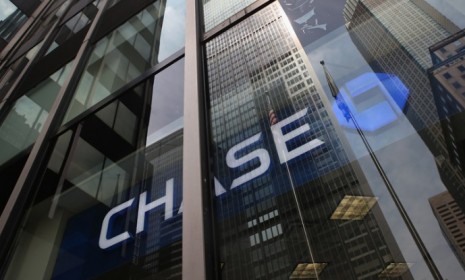Why JPMorgan Chase's stock is rising: 3 theories
A huge loss from a bad bet keeps growing larger, but investors appear undisturbed by the mega-bank's problems

JPMorgan Chase's earnings report for the second quarter showed that the bank had lost nearly $6 billion from a bad bet undertaken by a single trader who has come to be known as the "London Whale" for his outsized risk-taking. The admission appeared to leave JPMorgan open to claims that its much-vaunted "fortress balance sheet" model — in which risky investments are supposedly offset by protective measures — is flawed, and that the banking giant remains vulnerable to the types of losses that shook the industry during the financial crisis of 2008. However, investors are still pouring money into the bank, and its shares rose almost 6 percent on the day the report was released. Why is JPMorgan's stock rising? Here, three theories:
1. Investors believe the loss is an isolated event
"Most analysts think the London Whale has been harpooned," says Philip van Doorn at Minyanville. JPMorgan CEO Jamie Dimon insisted that the bet was a one-time mistake that would not happen again. Furthermore, there were several bright spots in the earnings report, including growth in the bank's commercial loan business, increased revenue from mortgages, and a drop in expenses. Indeed, many investors believe JPMorgan's shares are cheaply priced at the moment.
The Week
Escape your echo chamber. Get the facts behind the news, plus analysis from multiple perspectives.

Sign up for The Week's Free Newsletters
From our morning news briefing to a weekly Good News Newsletter, get the best of The Week delivered directly to your inbox.
From our morning news briefing to a weekly Good News Newsletter, get the best of The Week delivered directly to your inbox.
2. People are no longer rattled by Wall Street scandals
"Instead of gasps of horror," JPMorgan's massive loss has been greeted with yawns, says Gary Weiss at The Street. "It's plain that the media and the public are a little tired of Wall Street scandals," particularly with the advent of the Libor interest rate-rigging controversy, which erupted just as JPMorgan was preparing to issue its earnings report. So far, Dimon has been "one lucky dude" — he seems to be gliding by this controversy, when he really should be fired. "Every day that he stays on his job is still more proof that the system just doesn't work."
3. Investors simply don't care about the London Whale
Investors understand that Wall Street is "corrupt and rigged," and "they invest cynically, figuratively holding their noses," says Jim Jubak at MSN Money. The London Whale bet is certainly not a one-time problem, and JPMorgan is certainly not the only major bank engaging in such bets. "Goldman Sachs does it. Citigroup does it. Bank of America does it." They've all made risky trading "a core part of their business model," and the "gains and losses from those activities may be lumpy and may swing from plus to minus with any quarter," but it doesn't stop investors from dumping money into big bank stocks.
A free daily email with the biggest news stories of the day – and the best features from TheWeek.com
-
 Will SpaceX, OpenAI and Anthropic make 2026 the year of mega tech listings?
Will SpaceX, OpenAI and Anthropic make 2026 the year of mega tech listings?In Depth SpaceX float may come as soon as this year, and would be the largest IPO in history
-
 Reforming the House of Lords
Reforming the House of LordsThe Explainer Keir Starmer’s government regards reform of the House of Lords as ‘long overdue and essential’
-
 Sudoku: February 2026
Sudoku: February 2026Puzzles The daily medium sudoku puzzle from The Week